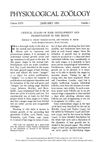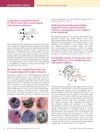 35 citations,
November 1931 in “Journal of Genetics”
35 citations,
November 1931 in “Journal of Genetics” Hairless mice lack fur due to a genetic mutation affecting skin response, not hormone issues.
 15 citations,
January 2002 in “Gynecological endocrinology”
15 citations,
January 2002 in “Gynecological endocrinology” Hormones affect skin aging and fat distribution, and treatments can help, but only minoxidil is proven for female hair loss.
 236 citations,
January 1951 in “Physiological zoology”
236 citations,
January 1951 in “Physiological zoology” Hair growth and pigmentation in mice involve specific stages crucial for research.
 120 citations,
November 2014 in “Biological Reviews”
120 citations,
November 2014 in “Biological Reviews” The telogen phase of hair growth is active and important for preparing hair follicles for regeneration, not just a resting stage.
 78 citations,
April 1994 in “Archives of dermatology”
78 citations,
April 1994 in “Archives of dermatology” The study found that Keratosis Pilaris Atrophicans is a genetic skin condition that starts in childhood, involves inflammation and scarring, and current treatments are only somewhat effective.
 64 citations,
September 2006 in “International journal of epidemiology”
64 citations,
September 2006 in “International journal of epidemiology” Cancer development is like natural selection, involving mutated cells and environmental factors.
 6 citations,
August 2022 in “The Italian Journal of Pediatrics/Italian journal of pediatrics”
6 citations,
August 2022 in “The Italian Journal of Pediatrics/Italian journal of pediatrics” New genetic mutations linked to rare skin disorders were found in three newborns.
 March 2024 in “medRxiv (Cold Spring Harbor Laboratory)”
March 2024 in “medRxiv (Cold Spring Harbor Laboratory)” Recent selection on immune response genes was identified across seven ethnicities.
 January 2012 in “Journal of Investigative Dermatology”
January 2012 in “Journal of Investigative Dermatology” Some Greek melanoma patients have gene mutations linked to increased cancer risk, a new color feature helps diagnose melanoma, the incidence of a skin condition in the Netherlands is rare, and a gene possibly affects male-pattern baldness.
 17 citations,
January 2001 in “Clinical and Experimental Dermatology”
17 citations,
January 2001 in “Clinical and Experimental Dermatology” Early treatment with immunoglobulin and aspirin reduces heart complications in children with Kawasaki disease.
 232 citations,
December 2005 in “Andrology”
232 citations,
December 2005 in “Andrology” PCOS is caused by both genetics and environmental factors like diet and obesity.
 83 citations,
July 2008 in “Current Opinion in Chemical Biology”
83 citations,
July 2008 in “Current Opinion in Chemical Biology” The document concludes that understanding sulfation biology is crucial for creating treatments due to its importance in biological functions and disease.
 47 citations,
August 2014 in “The Journal of Clinical Endocrinology and Metabolism”
47 citations,
August 2014 in “The Journal of Clinical Endocrinology and Metabolism” The research suggests that the global distribution of PCOS is likely due to historical human migration and that genes affecting PCOS may have different impacts on males and females.
 26 citations,
October 2017 in “Clinical Reviews in Allergy & Immunology”
26 citations,
October 2017 in “Clinical Reviews in Allergy & Immunology” Autoimmune liver diseases are likely linked to certain skin conditions like vitiligo and psoriasis.
 26 citations,
October 2014 in “Andrologia”
26 citations,
October 2014 in “Andrologia” Infertile men are more likely to produce sperm with abnormal chromosome numbers, which can affect pregnancy success and embryo health.
 9 citations,
March 2020 in “Gene”
9 citations,
March 2020 in “Gene” Certain gene variants in estrogen receptors are linked to polycystic ovary syndrome, mainly affecting metabolism, in Tunisian women.

Early NAS level changes affect alcohol consumption vulnerability.
 48 citations,
May 2019 in “Genome Biology”
48 citations,
May 2019 in “Genome Biology” Researchers found that certain RNA circles in the brain are linked to disease risk, but their exact role in disease is still unknown.
 19 citations,
December 2021 in “Endocrine Reviews”
19 citations,
December 2021 in “Endocrine Reviews” There are various effective hormone treatments for puberty induction in boys and girls with hypogonadism, and starting treatment early is important.
107 citations,
June 1997 in “PubMed” EGFR is essential for normal hair development and follicle differentiation.
 36 citations,
August 2011 in “Journal of Controlled Release”
36 citations,
August 2011 in “Journal of Controlled Release” Genetically-altered adult stem cells can help in wound healing and are becoming crucial in regenerative medicine and drug design.
22 citations,
July 2016 in “Cellular and Molecular Life Sciences” Genetic changes in mice help understand skin and hair disorders, aiding treatment development for acne and hair loss.
 13 citations,
December 2014 in “Stem Cells”
13 citations,
December 2014 in “Stem Cells” Hair and skin can regenerate without bulge stem cells due to other compensating cells.
5 citations,
April 2017 in “The journal of investigative dermatology/Journal of investigative dermatology” The gene therapy showed significant wound healing and was safe for treating severe RDEB.
 2 citations,
May 2021 in “Journal of the Endocrine Society”
2 citations,
May 2021 in “Journal of the Endocrine Society” Men with high genetic risk for Polycystic Ovary Syndrome (PCOS) have increased chances of obesity, type 2 diabetes, heart disease, and hair loss, showing PCOS risk factors can affect both genders.
 25 citations,
August 2007 in “Molecular Therapy”
25 citations,
August 2007 in “Molecular Therapy” Researchers found a safe and effective way to pick genetically modified skin cells with high growth potential using CD24.
 4 citations,
January 2023 in “Frontiers in Immunology”
4 citations,
January 2023 in “Frontiers in Immunology” Shorter telomeres in white blood cells may increase the risk of a common type of hair loss.
 1 citations,
October 2023 in “Frontiers in endocrinology”
1 citations,
October 2023 in “Frontiers in endocrinology” Regulating certain sex hormones may help delay facial aging.
 May 2024 in “Skin research and technology”
May 2024 in “Skin research and technology” Certain metabolites can either protect against or increase the risk of hair loss.
 87 citations,
July 2018 in “Biochimica et Biophysica Acta (BBA) - Molecular Cell Research”
87 citations,
July 2018 in “Biochimica et Biophysica Acta (BBA) - Molecular Cell Research” Mice studies show that Protein Phosphatase 2A is crucial for cell growth, development, and disease prevention.



























